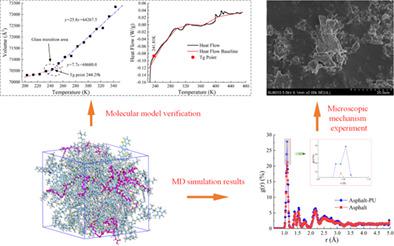当前位置:
X-MOL 学术
›
Polym. Eng. Sci.
›
论文详情
Our official English website, www.x-mol.net, welcomes your
feedback! (Note: you will need to create a separate account there.)
Mechanical performance analysis of polyurethane-modified asphalt using molecular dynamics method
Polymer Engineering and Science ( IF 3.2 ) Pub Date : 2021-07-30 , DOI: 10.1002/pen.25760 Pengzhen Lu 1 , Simin Huang 1 , Yang Shen 1 , Chenhao Zhou 1 , Limin Shao 1
Polymer Engineering and Science ( IF 3.2 ) Pub Date : 2021-07-30 , DOI: 10.1002/pen.25760 Pengzhen Lu 1 , Simin Huang 1 , Yang Shen 1 , Chenhao Zhou 1 , Limin Shao 1
Affiliation

|
In this study, the mechanical performance of polyurethane (PU)-modified asphalt was investigated. To this end, the molecular dynamics method was adopted to study the influence of the PU modifier on the compatibility, mechanical properties, and structure of asphalt. Using the Materials Studio software, a four-component molecular model of asphalt, a PU molecular model, and an asphalt–PU mixed system model were constructed, and the molecular density and glass transition temperature ( ) were used to verify the performance of the aforementioned models. Molecular dynamics simulations of the three molecular models were conducted under different temperatures, and the solubility parameter ( ), interaction energy, mechanical properties, and radial distribution functions (RDFs) were obtained. The results showed that at 413.15 K (140°C), the difference between the solubility parameters of the asphalt and PU molecules ( ) is the smallest, and their interaction reaches the most optimal phase state. The effects of the PU modifier on the Young's modulus, bulk modulus, and shear modulus of asphalt were studied. Finally, the RDF analysis showed that the PU modifier has a direct effect on the degree of swelling and dispersion between the aromatic–aromatic and saturate–saturate components in the asphalt, reducing the aggregation of both molecules. This verifies the PU modification effect.
中文翻译:

基于分子动力学的聚氨酯改性沥青力学性能分析
在这项研究中,研究了聚氨酯(PU)改性沥青的力学性能。为此,采用分子动力学方法研究了聚氨酯改性剂对沥青相容性、力学性能和结构的影响。使用 Materials Studio 软件构建了沥青四组分分子模型、PU 分子模型和沥青-PU 混合体系模型,并计算了分子密度和玻璃化转变温度() 用于验证上述模型的性能。三种分子模型在不同温度下进行分子动力学模拟,溶解度参数()、相互作用能、机械性能和径向分布函数 (RDF)。结果表明,在 413.15 K (140°C) 时,沥青和 PU 分子的溶解度参数之间存在差异 ()最小,它们的相互作用达到最优化的相态。研究了聚氨酯改性剂对沥青杨氏模量、体积模量和剪切模量的影响。最后,RDF 分析表明,PU 改性剂对沥青中芳香族-芳香族和饱和-饱和组分之间的溶胀度和分散度有直接影响,从而减少了两种分子的聚集。这验证了PU改性效果。
更新日期:2021-09-06
中文翻译:

基于分子动力学的聚氨酯改性沥青力学性能分析
在这项研究中,研究了聚氨酯(PU)改性沥青的力学性能。为此,采用分子动力学方法研究了聚氨酯改性剂对沥青相容性、力学性能和结构的影响。使用 Materials Studio 软件构建了沥青四组分分子模型、PU 分子模型和沥青-PU 混合体系模型,并计算了分子密度和玻璃化转变温度() 用于验证上述模型的性能。三种分子模型在不同温度下进行分子动力学模拟,溶解度参数()、相互作用能、机械性能和径向分布函数 (RDF)。结果表明,在 413.15 K (140°C) 时,沥青和 PU 分子的溶解度参数之间存在差异 ()最小,它们的相互作用达到最优化的相态。研究了聚氨酯改性剂对沥青杨氏模量、体积模量和剪切模量的影响。最后,RDF 分析表明,PU 改性剂对沥青中芳香族-芳香族和饱和-饱和组分之间的溶胀度和分散度有直接影响,从而减少了两种分子的聚集。这验证了PU改性效果。











































 京公网安备 11010802027423号
京公网安备 11010802027423号